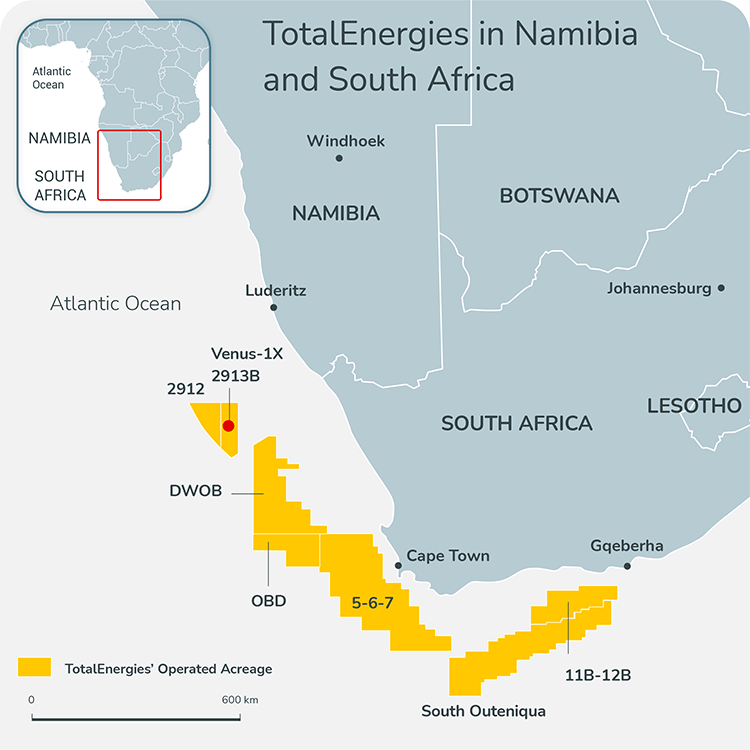 Energy Capital Power.com
Energy Capital Power.com Positioned as the world’s final frontier for hydrocarbon exploration, Africa is poised to experience significant economic growth in the coming years as a number of countries seek to capitalize on underexplored oil and gas prospects.
Namibia Strikes First Oil
Namibia, a nation of about 3 million people in Southern Africa, wants to start producing its own oil in four years. This news comes after Shell, a British multinational oil and gas company struck the country’s first offshore oil discovery at the Graff-1 well. Hailed as the “final frontier” of oil exploration in Africa, this discovery could usher in a wave of new investments, presenting a significant economic development opportunity for the country.
Namibia is potentially sitting on 11 billion barrels of oil and 2.2 trillion cubic feet of natural gas, attracting the attention of international oil companies such as Total Energies and ExxonMobil.
The country’s energy sector is underdeveloped, so the volume of infrastructure build-out (generation, distribution, etc) along the energy value chain will require large capital investments.
Having a domestic oil and gas sector would create domestic companies across the supply chain, increasing jobs and new business opportunities for the local population.
Namibia currently relies on intermittent hydropower and electricity imports from South Africa, so developing an oil and gas market could provide the country with long-term energy security.
Fossil Fuel Development at Odds with Paris Climate Accord
This discovery comes at a time when international organizations and governments are calling for an end to all new fossil fuel investments to reach the Paris Agreement climate goals. Humanity has already exhausted our carbon budget. The International Energy Agency revealed in its World Energy Outlook that no new fossil fuel investments can be made from 2020 onwards if humanity is to keep global warming to between 1.5-2 degrees.
To put this in perspective, if we have a 50% chance of keeping global warming under 1.5 degrees, around 60% of oil and gas, and 90% of coal must remain in the ground.
However, African leaders are accusing Western countries of climate hypocrisy. While Global North countries make international pledges to end public support for fossil fuel investments, those same countries are still developing their own fossil fuel resources at home.
The Global North and Climate Hypocrisy
For centuries, particularly in the last 50 years, Global North nations had the benefit of industrializing their societies through unrestricted use of fossil fuels. So calling for a unilateral ban on fossil fuel investments only robs African nations of that same developmental opportunity.
Also, this would not achieve major climate mitigation effects. The African continent is only responsible for about 3% of the world’s emissions (and barely counts for half a percent of historical emissions). According to the Energy For Growth hub even if the continent tripled its energy consumption just using natural gas (which is being seen as a transition fuel), the resulting emissions would be less than 1% of the global total.
The continent is sitting on about 100 billion barrels of oil and accounts for only six percent of the world’s natural gas reserves. So a blanket ban on fossil fuels while doing nothing to curb richer nations’ disproportionate emissions only recreates colonial dynamics. This could entrench poverty and stall the development of African countries.
Renewable energy needs to be supported by other sources because it is intermittent. Wealthier countries have the capacity to do this because their energy sectors are more developed. African countries aren’t in the same position to transition as quickly. Growth requires reliable and stable energy, and a blanket ban in the near term will slow down poverty reduction, limit job creation, and increase energy costs.
However, other environmental organizations have rejected the notion of continual burning of fossil fuels on the continent due to Africa’s vast renewable energy potential (Greenpeace Africa equated it to burning the house we live in). Africa is also set for a major population boom, with the likelihood of doubling its population birth rates by 2050 – with that will come increased energy use.
The Benefits of Renewable Energy Systems
The cost of renewable energy is steadily declining, and building a sustainable energy value chain creates diversified jobs while reducing the health impacts of pollution. Renewable energy could secure energy independence for individual countries, as fossil fuels are concentrated in certain places (it also spreads out the benefits of job creation to remote communities). Microgrids can diversify where electricity is produced and provide energy accessibility for many rural communities.
Leapfrogging to renewables can also provide long-term cost savings because fossil fuel energy consumption will become more expensive as carbon pricing mechanisms scale up. The infrastructure build-out required to extract fossil fuels creates a “lock-in” effect, where it will be more difficult for Africa to transition away from fossil fuels. Adequate returns on investment for this infrastructure mean continuing energy dependence on extraction. Expanding renewable energy infrastructure instead reduces the risk of stranded assets.
A Compromise — Natural Gas as a Transition Fuel
Achieving global climate justice means Western nations will need to foot the bill for developing countries’ transition to clean energy systems. That should include some development financing (public and private) for natural gas projects in Africa. Natural gas is considered a “transition fuel” because it is less polluting than coal and crude oil, providing slightly cleaner power while countries scale up low-carbon energy capacity.
But while major governments have declared their intentions to ban new fossil fuel investments, there is still hope for securing investments in natural gas for Africa. Earlier this month, the European Commission included natural gas in its proposed EU taxonomy for sustainable investment.
EU Taxonomy is supposed to guide private investors on what counts as a sustainable investment that will advance the bloc’s climate goals. Given that the EU is further ahead in its energy transition, this has the potential to set the standard for sustainable investments worldwide.
Some Western governments and institutions have skewered the European Commission for including natural gas — labeling this a major greenwashing effort. However, this critique lacks awareness of the ways international rules set by Western-dominated entities can perpetuate the underdevelopment of Africa. This climate hypocrisy risks undermining Africa’s future growth and diminishes the West’s supposed commitment to ensuring a truly “just and equitable” transition.

